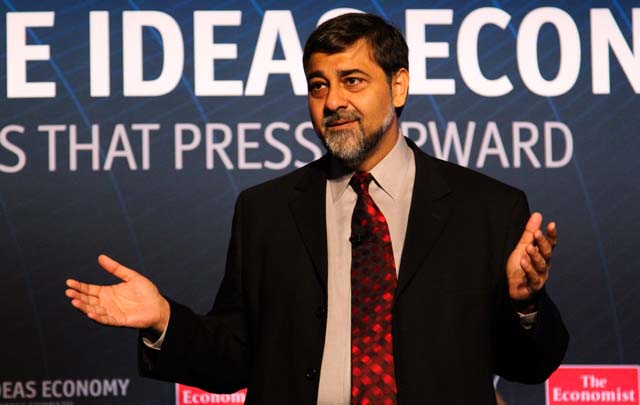Vivek Wadhwa on Globalized Education
Knowledge creation has globalized and there is a fierce race underway for talent. We can fear this all we want, but we have a choice: raise protectionist barriers and lose the race, or recognize the new reality and take advantage of the opportunities for collaboration and innovation. In Silicon Valley, in particular, ideas are the currency that matter, and these are the keys to innovation and economic success.

Recently I participated in a fascinating series of discussions at The Economist magazine’s summit called “The Ideas Economy: Human Potential – When the world grows up”. I came away with the realization that we’re not tapping into even a tiny fraction of the potential that human beings have. Additionally, we have a unique opportunity, today, to leverage the entire world’s talent.
At the event, Kauffman Foundation senior fellow Ben Wildavsky discussed key findings from his book, The Great Brain Race. He documented that student mobility is now taking place to a degree never been seen in history. More than three million students travel outside their home countries to study—a 57 percent increase in just the past decade.
What’s more, those extraordinary numbers are projected to nearly triple, to 8 million, by 2025. In a competitive global marketplace, student recruiting is fierce. (New Zealand even resorted to a viral video showing two students making out in the corner of a hot tub; the camera pulls back to show a pair of disapproving adults in the other corner followed by the caption “Get further away from your parents”.)
The Viral Video
Western universities are bringing their offerings to students all over the world. There now have more than 160 branch campuses, mostly in the Middle East and Asia—an increase of 43 percent in just a few years.
China’s Ivy League and More…
Perhaps most significant, according to Wildavsky, is the intense desire among nations from China and South Korea to Saudi Arabia to create universities that can compete with the top-rated institutions in the United States and Britain. They know that universities are vital to innovation and economic growth, and they’re no longer content just to send students overseas or to host branch campuses on their soil—they want to create world-class institutions of their own. They are:
- Pouring money into education. China is expanding and improving several dozen universities, and recently announced formation of an elite consortium known as China’s Ivy League. In Saudi Arabia, King Abdullah earmarked $10 billion of his own funds to the brand-new King Abdullah University of Science and Technology (KAUST), giving it the sixth largest endowment in the world at its inception.
- Recruiting faculty globally. China is working hard to lure back overseas Chinese who have Western degrees. South Korea is making a big push to recruit foreigners—its elite Korea Advanced Institute of Science and Technology recruited the president of the National University of Singapore as its first president.
- Forging partnerships. This is a key strategy of Singapore as it strives to become a global academic hub. It is bringing in foreign schools such as Duke University’s medical center, the University of Chicago’s business school, and MIT. South Korea is creating an academic free-trade zone near the Incheon International Airport, where it is hosting a number of Western branch campuses.
The U.S. is still the biggest talent magnet, however, with two-thirds of the world’s foreign graduate students at American universities. But what is there for the U.S. to worry about?
- Our market share is falling as other countries step up their recruiting efforts. Among OECD nations, the U.S. share of foreign students dropped from 32 percent to 23 percent from 1998 to 2007. Many Asian countries that have traditionally been “sender” nations have set ambitious targets to recruit more foreign students, usually from their own region.
- There is a battle for faculty talent. Half the top physicists in the world no longer work in their home countries. Three-quarters of young economists in top U.S. universities earned their undergraduate degrees in another nation.
- Foreign students are returning home. As I have documented with my research, Indian and Chinese students don’t feel welcome or see enough opportunity in the U.S. any more. So, the U.S. is experiencing the first brain drain in its history.
- Tsinghua and Peking Universities combined recently surpassed UC-Berkeley as the leading source of students earning U.S. PhDs.
Despite the new realities, U.S. leaders have been enacting misguided legislation to close the doors, as I wrote about in this piece. This is hastening the brain drain and scaring away the world’s best and brightest who might otherwise come here to study or work.
Protectionism in education is actually a global ill. India has, for years, kept out foreign universities, despite a huge hunger for education. Only now is it debating legislation to open up the market, but even this will come with many restrictions—so it is unclear if it will make a dent. Indian protectionism of education has been so bad, and has weakened its education system so much, that a few years ago the president of IIT-Bombay barred students from taking overseas internships in an effort to keep Indian brainpower at home. Malaysia limits the proportion of foreign students in its public universities to 5 percent. In the U.S., the University of Tennessee, until a decade or so ago, limited foreign graduate students to 20 percent of each department.
Wildavsky says that knowledge isn’t a finite resource like gold or diamonds—it’s something that can grow; it is a public good. I agree that knowledge can’t be contained within the borders of one country. This means that innovators around the world, including U.S. entrepreneurs, can take advantage of research breakthroughs in places like China or India.
So yes, we should do everything we can to boost our own human capital. But rather than fearing the globalization of higher education, which will be counterproductive, we should embrace it. As executives in the tech industry know, the best strategy to compete is to hire all stars from wherever you can find them.

(Vivek Wadhwa is an entrepreneur turned academic. He is a Visiting Scholar at UC-Berkeley, Senior Research Associate at Harvard Law School and Director of Research at the Center for Entrepreneurship and Research Commercialization at Duke University. You can follow him on Twitter at @vwadhwa and find his research at www.wadhwa.com)

